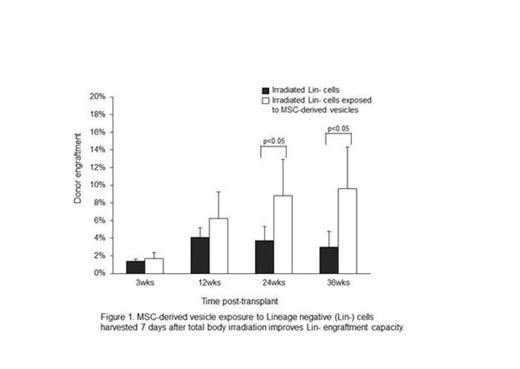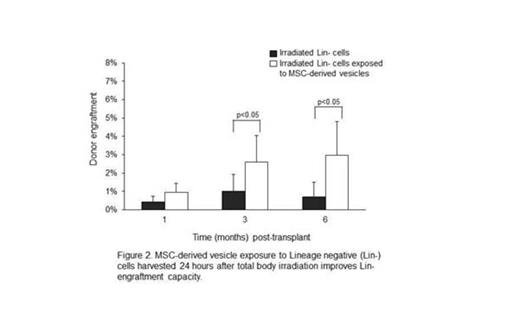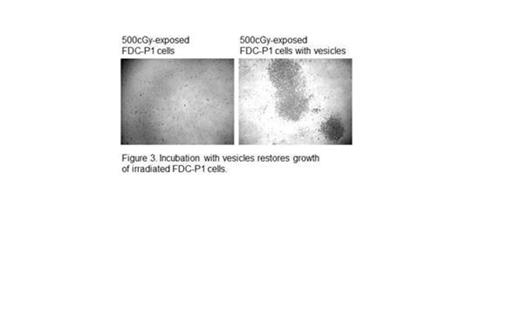Abstract
Extracellular vesicles, including exosomes and microvesicles, have been shown to epigenetically modulate cell fate (Aliotta et al JEV, 2013). We have evaluated the effect of murine or human mesenchymal stem cell (MSC)-derived vesicles on marrow from irradiated mice or on the marrow cell line, FDC-P1, irradiated in vitro. B6.SJL mice were exposed to 0 or 100 cGy whole body irradiation and 7 days later marrow was harvested, lineage depleted and then cultured with or without the addition of murine MSC-derived vesicles for 48 hours. The cells were then engrafted into 200 cGy exposed C57BL/6J mice and engraftment was analyzed at 3, 12, 24 and 36 weeks post-transplant. Vesicle exposure led to a statistically significant increase in engraftment by the irradiated cells at 24 and 36 weeks with the average percent donor engraftment equal to 8.8 ± 4% and 9.6 ± 5% for the vesicle treated group compared to 3.7 ± 2% and 3 ± 2% for the non-vesicle treated groups at 24 weeks and 36 weeks, respectively (Figure 1). In a similar experiment, murine marrow was harvested 24 hours after 100 cGy whole body irradiation, and cultured with and without vesicles for 24 hours. There was a statistically significant increase in donor engraftment by the Lineage negative cells incubated with MSC-derived vesicles at 3 and 6 months (Figure 2). The increase in engraftment potential with vesicle exposure persisted in serial transplantation. These studies indicate that MSC-derived vesicles can reverse radiation damage to marrow when administered either 1 or 7 days after irradiation. The in vivo effect of murine MSC-derived vesicles on post-radiation blood cell count recovery was tested. C57BL/6 mice were exposed to 500 cGy total body irradiation. MSC-derived vesicles were then injected intravenously 6, 24 and 72 hours after irradiation. WBC recovery compared to non- irradiated mice was 17% in the non-vesicle group and 37% in the vesicle- injected group at 14 days; the values at 28 days were 61 and 89%, respectively, indicating that vesicle injection enhanced leukocyte recovery following radiation damage. Marrow cells from the non-irradiated, the irradiated and the irradiated plus vesicle-treated mice were then analyzed for gene expression. Twelve genes were elevated in the irradiated cells and the elevations were reversed by vesicle exposure while 17 genes were depressed in the irradiated cells and the depressions reversed by vesicle exposure. Studies with the marrow cell line, FDC-P1, showed that apoptosis in irradiated cells was reversed by exposure to MSC-derived vesicles and growth of irradiated cells was restored. Restoration of growth by in vitro exposure to MSC-derived vesicles is shown in Figure 3. In summary, these data indicate that MSC-derived vesicles have the capacity to ameliorate radiation-induced damage to marrow and may represent an important biologic for use in radiation exposures.
Disclosures:
No relevant conflicts of interest to declare.
Author notes
*
Asterisk with author names denotes non-ASH members.
© 2013 by The American Society of Hematology
2013




This feature is available to Subscribers Only
Sign In or Create an Account Close Modal